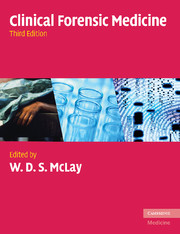Book contents
- Frontmatter
- Contents
- List of contributors
- Preface
- 1 Legal systems: a world view
- 2 Scottish legal system
- 3 The Police in the United Kingdom
- 4 The practitioner's obligations
- 5 The doctor in court
- 6 Custody medicine: physical conditions
- 7 Custody medicine: mental illness and psychological conditions
- 8 Substance misuse
- 9 Alcohol, drugs and driving
- 10 Injury
- 11 Child abuse: physical
- 12 Child abuse: sexual
- 13 Adult sexual offences
- 14 Management of at-risk exposures and infection control in custody
- 15 Scenes of crime
- 16 Forensic science
- 17 Forensic dentistry
- 18 Investigation of death
- 19 Dealing with a major disaster
- 20 Occupational health of police officers
- Index
- References
20 - Occupational health of police officers
Published online by Cambridge University Press: 12 August 2009
- Frontmatter
- Contents
- List of contributors
- Preface
- 1 Legal systems: a world view
- 2 Scottish legal system
- 3 The Police in the United Kingdom
- 4 The practitioner's obligations
- 5 The doctor in court
- 6 Custody medicine: physical conditions
- 7 Custody medicine: mental illness and psychological conditions
- 8 Substance misuse
- 9 Alcohol, drugs and driving
- 10 Injury
- 11 Child abuse: physical
- 12 Child abuse: sexual
- 13 Adult sexual offences
- 14 Management of at-risk exposures and infection control in custody
- 15 Scenes of crime
- 16 Forensic science
- 17 Forensic dentistry
- 18 Investigation of death
- 19 Dealing with a major disaster
- 20 Occupational health of police officers
- Index
- References
Summary
Although, in constitutional terms, constables are independent holders of an office under the Crown, the Police (Health and Safety) Regulations 1999 conferred on them the status of employees for the purposes of health and safety legislation. The terms of the European Framework Directive for Health and Safety require police forces to compile risk assessments covering officers and civilian employees, many of whom undertake essentially operational tasks formerly done by police officers. Employers must take all reasonable steps to protect the workforce, but an onus remains on employees to take proper care of themselves and their colleagues.
Forces have introduced occupational health units with a varying remit. Despite the availability of specialist occupational health advice, forensic physicians are, in practice, often on hand to take immediate action or to provide clinical reassurance.
Fitness for the tasks set by society entails a basic level of physical health and stamina in recruits; injury and ill-health will reduce the effectiveness of serving officers, and there may come a time when capacity for continued service must be assessed. The occupational health physician's concern is to look far beyond management concepts of reducing the number and duration of sickness absences.
The operational hazards of police work [1] are diverse and unpredictable, but much has been done to improve techniques of self-protection, accompanied by the introduction of safety equipment including stab-proof vests, side-handled batons, CS spray and rigid handcuffs. Despite all of these, officers continue to be injured.
- Type
- Chapter
- Information
- Clinical Forensic Medicine , pp. 229 - 236Publisher: Cambridge University PressPrint publication year: 2009



